Gemini vs. ChatGPT: AI Apps Head-to-Head
Gemini and ChatGPT are two of the leading generative AI applications available on the market today, and both provide easily accessible interfaces to chat, question, troubleshoot, and create content. While both Gemini and ChatGPT extend useful features, they each have distinct strengths and areas for growth and improvement. We’ll take a in-depth comparison of these […]
The post Gemini vs. ChatGPT: AI Apps Head-to-Head appeared first on eWEEK.
Gemini and ChatGPT are two of the leading generative AI applications available on the market today, and both provide easily accessible interfaces to chat, question, troubleshoot, and create content.
While both Gemini and ChatGPT extend useful features, they each have distinct strengths and areas for growth and improvement. We’ll take a in-depth comparison of these AI-based features, but first, here’s a quick summary of each tool’s key differentiators:
- Gemini: Best for an affordable alternative to ChatGPT that generates high-quality informational and conversational content for both business and recreational users. Compared to ChatGPT, Gemini offers more transparent and responsible AI, directly connects with the internet and other Google resources in all plans, and provides a more effective system for content quality management.
- ChatGPT: Best for an established content generation and AI chatbot tool that offers a range of useful features to both casual and professional users. Compared to Gemini, ChatGPT is currently embedded in more third-party business applications, is easier to use across multiple channels, and offers a range of more established generative AI multimodal content production features.
TABLE OF CONTENTS
Gemini vs. ChatGPT at a Glance
We’ll take a dedicated look at how Gemini and ChatGPT perform in each of these categories below, while also considering how well these generative AI tools perform in terms of core criteria. Here’s a quick comparison table:
| Price | Core Features | Ease of Use and Implementation | Output Quality and Relevance | Enterprise Use Cases | |
|---|---|---|---|---|---|
| Gemini | Winner | Dependent on Use Case | Dependent on Use Case | ||
| ChatGPT | Winner | Winner | Dependent on Use Case | Dependent on Use Case |
Note: Google’s Gemini used to be called Bard. To read our original in-depth comparison, see ChatGPT vs Google Bard: Generative AI Comparison.
Gemini AI App Overview
Gemini, previously known as Bard, is a large language model, content generation and AI chatbot from Google’s family of Gemini AI solutions. It runs on Gemini 1.0, Google’s latest development in large language model technology. Like other LLM-based content generation and AI chatbot solutions, Gemini is designed to generate real-time responses to a variety of user queries, including some multimodal queries.
What sets this tool apart is that all users — including free plan users — can benefit from real-time internet and search connectivity, as well as basic extensions for popular Google tools like Maps and YouTube. Paid plans and business users can benefit from additional options, including an add-on for Google Workspace.
Key Features
- Quality- and fact-checking buttons: Gemini includes multiple buttons for content feedback, refinement, and fact-checking. Users can give a thumbs-up or thumbs-down response to generated content and provide further feedback about what did or didn’t work. They can also modify responses for length or tone, select different drafts that the tool has generated, or use the Google Search button to fact-check the response against online sources.
- Internet connectivity: Both free and paid versions of Gemini are connected to Google Search, which provides real-time data and research capabilities for user queries. In many cases, Gemini’s answers are supplemented inline with online sources, such as a relevant Wikipedia page or link.
- Google widget extensions: Depending on the plan you select, users can access Google Flights, Hotels, Maps, Workspace, and YouTube widgets with a simple toggle in Gemini’s settings. These tools are particularly useful for refined searches related to travel, multimedia, or workplace resources.
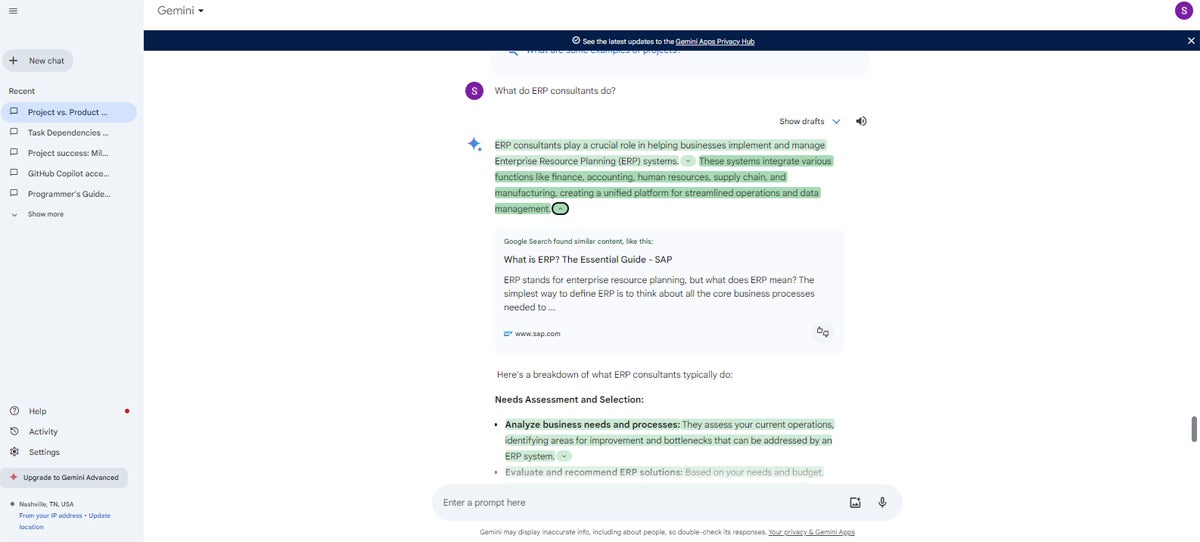
Pros
- Connection to the internet, search, and relevant widgets and apps.
- Built-in fact-checking, response rating, and QA features.
Cons
- Issues with certain output types, especially images.
- Limited functionality for iOS users.
For a full overview of today’s generative AI tools, read our guide: Top 20 Generative AI Tools & Applications in 2024
ChatGPT AI App Overview
ChatGPT is a generative AI chatbot and content creation tool that can handle multimodal inputs and outputs, such as text, images, and code. It is a generative AI tool that comes from OpenAI, one of the leading generative AI solutions providers on the market today. Because it’s an OpenAI tool, ChatGPT integrates seamlessly with other OpenAI tools like DALL-E.
Depending on whether you’re using the free version or a paid plan, ChatGPT runs on either GPT-3.5 or GPT-4, with GPT-4 offering better performance and accuracy to subscribers. Generally speaking, users select ChatGPT over similar tools for its stability, extensive training, and customization features that are especially supported through APIs and fine-tuned model options.
Key Features
- Multimodal content outputs: Paying users can use text, voice, images, or code as inputs and receive text, voice, images, or code as outputs from ChatGPT. With the introduction of Sora, a text-to-video generation tool, video may be added to this list in the future.
- Coding support: ChatGPT can handle code completion, code snippet creation, code QA tasks, and code explanations for a variety of programming situations and use cases. All of this prompting can be done in plaintext and natural language.
- API and fine-tuning options: OpenAI offers a range of APIs and fine-tuning models that can be used to create custom versions of ChatGPT on a business’ own applications and platforms. Options include GPT-4 Turbo and GPT-4, as well as a GPT-3.5 Turbo fine-tuning model.
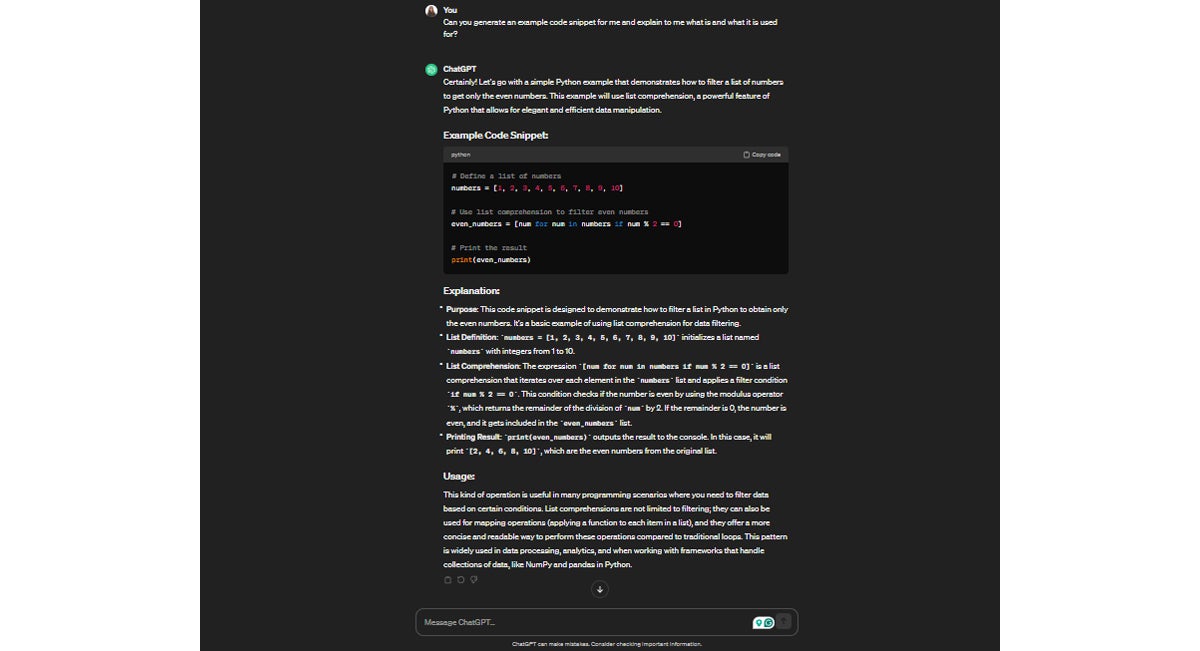
Pros
- Quick and accurate multimodal content generation.
- Multiple access channels, including mobile app.
Cons
- Knowledge window limitations can lead to outdated, inaccurate responses.
- Limited transparency in training and data collection processes.
Best for Pricing: Gemini
While it’s a close call due to their similar pricing plans and features, Gemini offers a slightly more affordable and user-friendly pricing structure.
Gemini is available in two primary tiers: one is a free limited version of Google Gemini, while the other — Gemini Advanced — is available with a Google One AI Premium subscription. This subscription is $0 for the first two months and $19.99 per month after this initial trial period.
Gemini can also be purchased for Google Workspace, with the Business add-on for Google Workspace starting at $20 per user per month, billed annually. Gemini Enterprise for Google Workspace starts at $30 per user per month, billed annually. Both of these tiers can be paid through flexible monthly payment plans or via a fixed annual payment plan.
ChatGPT is also available in a free limited version, as well as in three paid plan tiers: ChatGPT Plus is $20 per user, billed monthly; ChatGPT Team is $25 per user per month, billed annually, or $30 per user billed monthly; and pricing information for ChatGPT Enterprise is available upon request.
Gemini’s free plan includes Google Search capabilities and access to most of Gemini’s widgets, whereas Bing Search capabilities are only available to ChatGPT’s paid subscriber plans. Additionally, while OpenAI offers users more APIs and fine-tuning options, none of these solutions are available for free.
In contrast, the Gemini 1.0 Pro API is freely available in Google AI Studio for up to 60 queries per minute. Also of note, the paid, more advanced tier of Gemini can be used for free for the first two months, while none of the paid ChatGPT plans are accessible through free trials.
At first glance, the pricing between these two tools looks almost identical, with ChatGPT having the advantage of more higher-tier paid plan subscriptions. However, Gemini wins this category because of the wider range of features that are available to users at no cost.
Best for Core Features: ChatGPT
At this time, ChatGPT offers more variety and stability in its core features compared to Gemini.
ChatGPT has been publicly available since November 2022, and since that time its feature set has expanded and become more reliable. Compared to Gemini and most of its competitors, ChatGPT offers more API and fine-tuning options, more plan tiers, more multimodal options (including image content generation, which Google has paused for Gemini), better mobile operations and usability, higher response speeds, basic feedback mechanisms, search on paid plans, and more willingness to respond to a range of questions with accurate answers. For most queries, ChatGPT is also better at maintaining a conversational tone.
In contrast, Gemini offers limited API capabilities, two traditional plan tiers and separate Google Workspace tiers, multimodal inputs with more limits on outputs, mobile and desktop accessibility, extensive feedback and QA features, internet search supplements on all plans, and the ability to answer most questions in either a conversational or professional tone.
Comparatively speaking, Gemini is not as willing to answer more complex questions conversationally or directly, and it is often slower to generate its responses. However, Gemini is more natively connected with office suite tools, the internet, and internet-based widgets that can support enriched searches.
ChatGPT wins this category, as its feature set meets most of the needs of its users and is consistent enough to produce quick, accurate, and multimodal responses on a variety of subjects. Nevertheless, Gemini puts up a tough fight in this competition, and especially with all of the improvements and revisions that Google is working on right now, it could tie or surpass ChatGPT at a later date.
For a deeper understanding of how generative AI can support your work, see our guide: The Benefits of Generative AI
Best for Ease of Use and Implementation: ChatGPT
ChatGPT and Gemini provide different features and benefits that contribute to user-friendliness, but overall, ChatGPT has a slight edge here.
For the regular online versions of each tool, Gemini and ChatGPT each offer unique benefits. For example, I have the option to prompt Gemini with text, images, a combination of the two, and voice via microphone. On the free version of the ChatGPT desktop tool, I am only able to prompt with text, though more options are available with paid plans.
With Gemini’s responses online, I can either read the generated text or click a button for a voice reader, which is great for accessibility. ChatGPT does not allow me to prompt or listen to answers with a voice reader on my computer.

As far as desktop connectivity goes, ChatGPT performs much better. Sure, Gemini offers some built-in Google widgets that can supplement my searches, but they’re essentially extensions of the search capabilities that are already there. In contrast, ChatGPT provides easy access to some of my preferred third-party apps directly in the online interface.
Below, you’ll see that a button for Grammarly — a third-party writing and grammar application that I use — shows up in the prompting line for ChatGPT so I can use this other tool to more easily correct or rewrite my prompts for better results. This third-party tool does not show up on Gemini’s desktop version for me.

Now, let’s talk about mobility. Gemini recently became available in mobile apps for Android and iOS, though it is somewhat limited for Apple users, as there’s no dedicated Gemini app in the App Store. iOS users can download the Google app and, from its home page, toggle between traditional Google Search and Gemini.
Note that when I began my research, the Gemini tab was not yet available, but after a few days, I could access it on my device easily. This is a new feature that is rolling out as we speak, so refresh your iOS and app if this feature is not yet showing up for you. For the mobile version of Gemini, users seem to have very similar prompting and feedback options to what they have in the desktop/online version of the tool.
ChatGPT has full-featured mobile apps for both Android and iOS users. Compared to its web version, ChatGPT’s voice capabilities seem to be better on mobile, with users having the option to prompt with a voice and hear responses read with an AI voice reader. An additional cool feature that Gemini currently lacks: ChatGPT users can select from different AI voice companions, all of which sound slightly more human than the default Gemini voice.
For APIs, Gemini seems to have a more straightforward, singular approach to API access through Google AI Studio, which is a user-friendly interface that many people praise. On the other hand, ChatGPT functionality is available in more API and fine-tuning options, and OpenAI provides users with very detailed documentation to help them use these solutions effectively.
In summary, ChatGPT wins with a small margin of victory because of its third-party app connectivity and its slightly more accessible mobile interface for iOS customers. However, if you’re most interested in voice tools, Gemini may be a more viable option.
Best for Output Quality and Relevance: It Depends
ChatGPT and Gemini excel in different areas of output quality and relevance criteria, so it’s difficult to pick a winner in this category.
ChatGPT tends to respond to a wider variety of user queries and requests with accuracy, but Gemini offers more quality management features to refine the quality of responses.
User reviews consistently comment on how much more accurate, consistent, human-like, and detailed ChatGPT has become through GPT-3.5 and GPT-4. Though ChatGPT will not provide offensive or problematic answers without very strategic prompting (and the occasional AI hallucination), it is open to responding to more queries with greater detail than Gemini typically is.
One of the biggest complaints users currently have regarding Gemini is how often the tool tells users it cannot or will not answer their questions — even benign ones — because of some kind of policy or prompting issue.
However, there’s something to be said for the additional safeguards and feedback mechanisms built into Gemini. ChatGPT includes very basic feedback options, with a thumbs-down button option that shows up after each output. Upon clicking, users are given the opportunity to provide prewritten or custom feedback to OpenAI. From there, they can either ask a similar question or move on to something else.
With Gemini, users have many more ways that they can express concern or modify responses that don’t work for them. Thumbs-up and thumbs-down buttons are both available; once they’re clicked, users can provide either positive or negative feedback to help the Google team improve Gemini. Users can also modify responses to be shorter, longer, simpler, more casual, or more professional, depending on what they need.
There’s also the option to select a different drafted response that Gemini has crafted or to report a legal issue if there are greater concerns with the content that’s been generated.
Most significantly, Gemini includes a Google Search button that allows users to fact-check responses with the help of the internet. Once the fact check is complete, different parts of Gemini’s generated content will be highlighted in either green or orange. Green indicates that the response has been proven by an online source, which users can review with the dropdown button, while orange indicates that no relevant online sources confirm what Gemini has written.
In sum, if you want built-in tools to review and manage content quality, Gemini is the better option here, but if you prefer a tool that is better at generating conversational content in response to nearly all user prompts, ChatGPT will perform best for your needs.
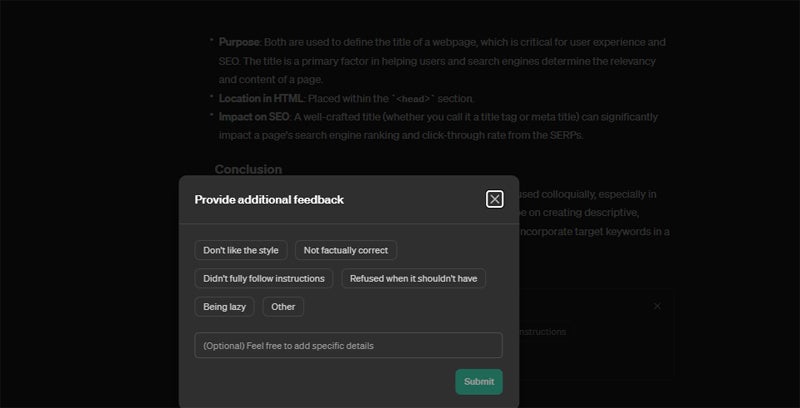
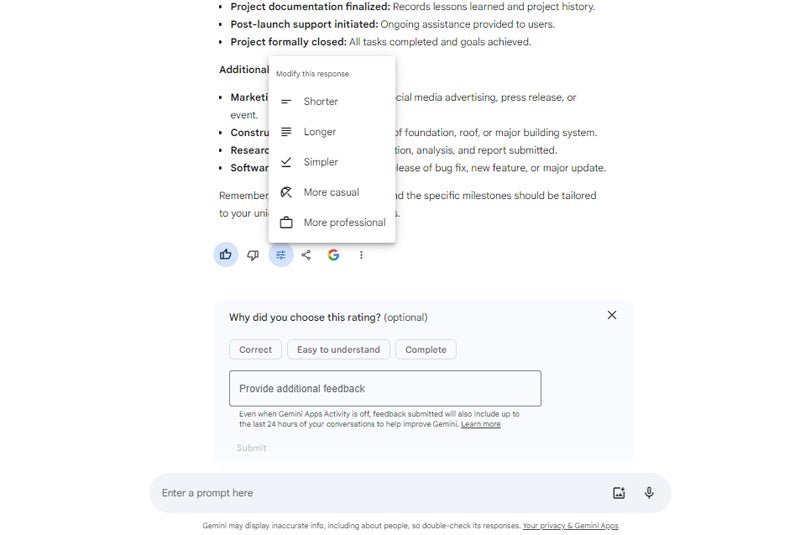
Best for Enterprise Use Cases: It Depends
ChatGPT and Gemini each have built-in features, integrations, and/or add-ons for business users; the best enterprise solution for your business will depend on your current tool stack and preferred connectivity approach.
With recent upgrades and additions, Gemini is ideal for Google Workspace users. A paid add-on enables businesses to connect Gemini directly to their organization’s Workspace applications, including Google Docs, Sheets, Slides, and Meet. With this add-on, users can benefit from AI assistance on tasks like email composition, blog writing, competitor research, and more. Gemini for Google Workspace starts at $20 per user per month.
ChatGPT enterprise does not directly embed into your business applications (unless you fine-tune or configure OpenAI’s APIs to your specific use case), as it is not part of a greater ecosystem of business and office suite applications. However, because of how configurable its base model is, GPT-4 and ChatGPT are already powering features in several popular business tools, including Microsoft Copilot, which is now available in Microsoft 365 office products and other tools.
Generally speaking, OpenAI offers some of the best APIs and fine-tuning models for enterprise generative AI users, so if you’re looking to create a custom ChatGPT-like solution, you’ll want to work with OpenAI over all other competitors.
Ultimately, Gemini is a better enterprise solution for users who are already invested in or interested in working with Google Workspace tools, while ChatGPT is a more malleable solution for other business tools and use cases, if you have the know-how and desire to fine-tune OpenAI models to meet your requirements.
To uderstand the many ways that generative AI is use for business, see our guide: 15 Generative AI Enterprise Use Cases
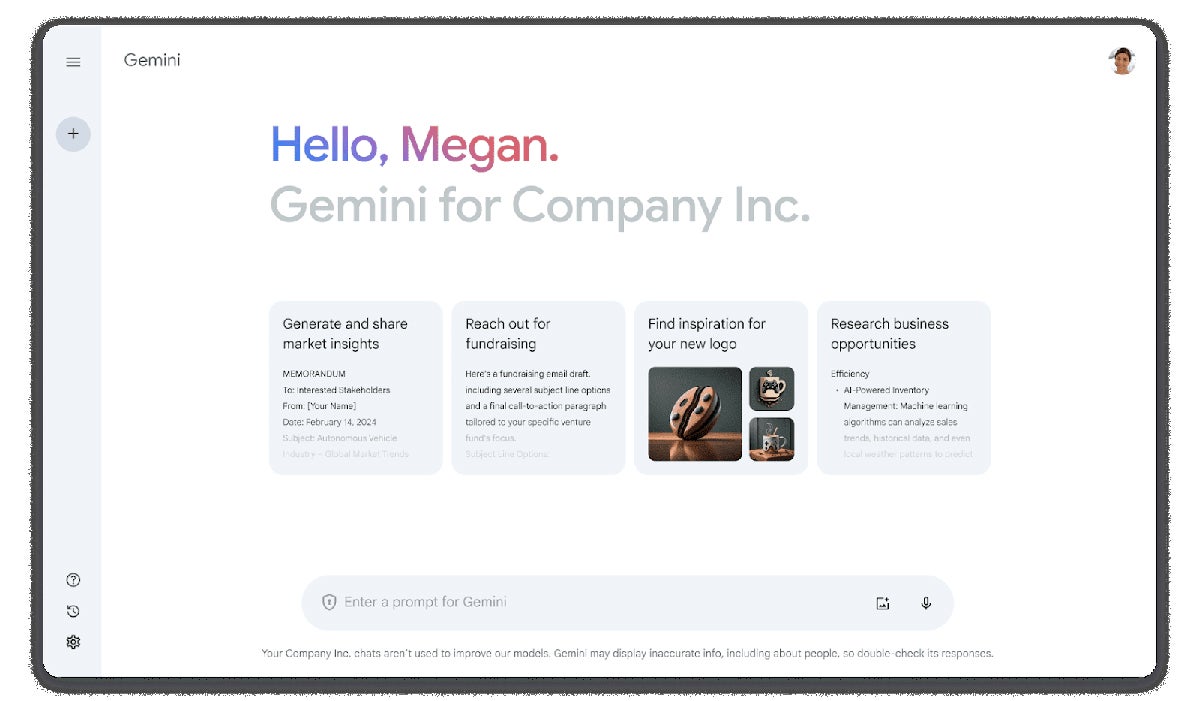
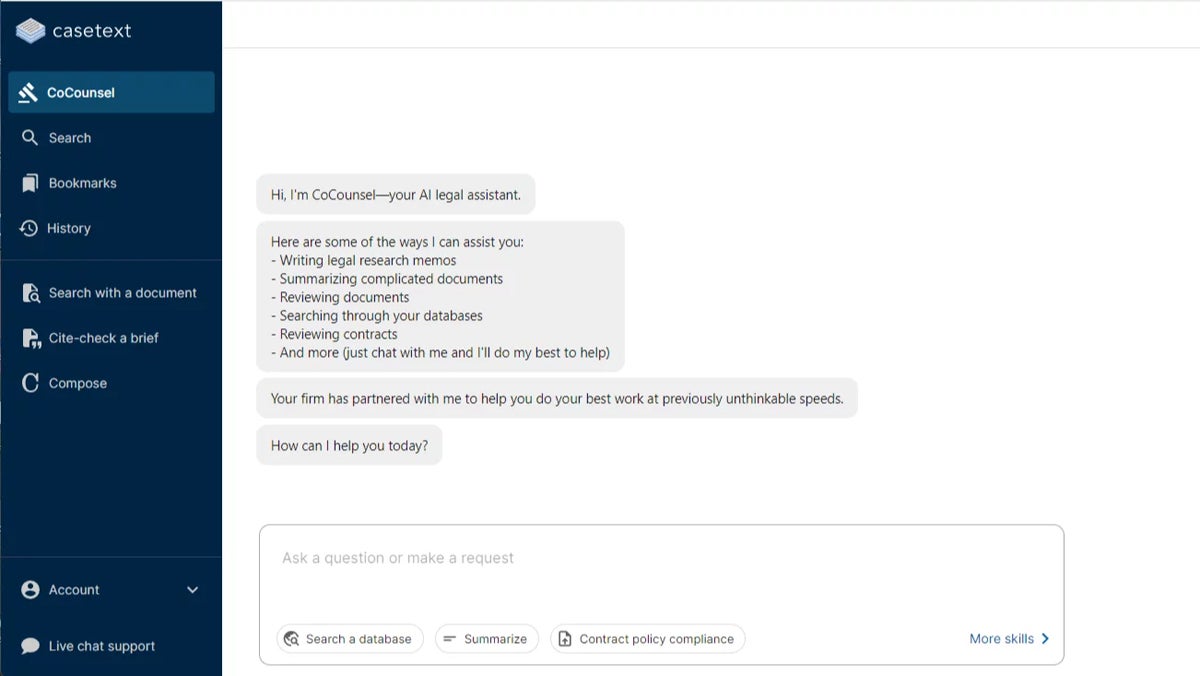
Who Shouldn’t Use Gemini or ChatGPT?
While Gemini and ChatGPT are both leaders in the generative AI landscape, they each have their limitations that might cause prospective buyers to hesitate. However, it can be difficult to wade through all of the tools’ different features to determine if they offer what you need. To simplify this search, we’ve compiled lists of reasons why users may want to consider alternatives to these tools:
Who Shouldn’t Use Gemini
- Users who want a tool that integrates well with Microsoft 365 and Microsoft products.
- Users who need high-powered coding and developer tools.
- Users who need reliable image content generation (though this limitation may be mitigated soon).
- Users who want to integrate with non-Google enterprise tools and applications.
- Users who want an established, stable tool with few major changes on the horizon.
Who Shouldn’t Use ChatGPT
- Users who want free content generated based on real-time data and internet search results (though GPT-4-based, paid plans can benefit from Microsoft Bing access).
- Users who need high-powered coding and developer tools.
- Users who are already invested in Google Workspace products and tools.
- Users who want built-in quality management features.
- Users who want access to comprehensive features in a free tool; most advanced features are only available in paid plans.
4 Best AI Alternatives to Gemini & ChatGPT
![]()
Claude
Claude is a generative AI assistant and chatbot from Anthropic that is designed for both business and personal use. This solution is specifically designed with ethical and responsible AI best practices in mind: Its developers have trained Claude in a way that limits its ability to generate offensive content. A free, limited version of the tool is available, as well as three paid subscription tiers. Many users select this generative AI tool not only for its ethical approach but also for its massive context windows.
For a complete roundup of today’s leading AI chatbot tools, see our guide: 20 Best AI Chatbots in 2024
![]()
Jasper
Jasper is an AI content creation and assistance tool focused on marketing and digital content creation for generative AI enterprise use cases. It can generate text and relevant business imagery, and it’s also capable of creating content based on your business’s documents and other resources. With a browser extension and a built-in feature to move Jasper content into business documents, many users select this tool because of how seamlessly it fits into their current workplace routines and workflows.
![]()
Chatsonic
Chatsonic is a generative AI solution that combines many of the features found in its competitors’ disparate tools. For example, while Chatsonic is based on large language models like GPT-4, it benefits from a connection to Google that supports search-based real-time results, as well as the ability to attach PDF documents and online resources for AI-driven summaries and explanations. Chatsonic also provides users with a large library of prewritten prompts, making it an effective tool for novices or creatives who need additional support getting started.
![]()
GitHub Copilot
GitHub Copilot is a generative AI assistant that is specifically designed for coding and developer projects. It can be used to generate new code, fact-check or refine existing code, and troubleshoot coding problems with creative solutions and recommendations. While its chat and content generation capabilities are fairly limited outside of coding and programming needs, it is one of the most effective solutions on the market for developers, especially with its deep integration into the GitHub ecosystem.
To learn more about how GitHub can serve your needs, read our guide: GitHub Copilot vs. ChatGPT: Ultimate AI App Comparison
Review Methodology
Below, you will find the core criteria that we used to evaluate Gemini and ChatGPT. We focused on the areas that are most important to both personal and business users. Each criteria category is weighted to reflect how important it is to the overall performance of a generative AI chatbot tool.
Content Quality and Accuracy– 40%
Generative AI chatbots and assistants need to generate content that can keep up with the complexities and expectations of human researchers, generating consistent and accurate content for users. For this criteria, we specifically looked at the frequency of accurate responses, the accuracy of responses for more complex prompts, the depth of responses, alignment with initial prompts, and how closely generated content resembled human-like quality and tone. We also considered what tools were available to manage quality and accuracy directly within each tool.
Ease of Use and Accessibility – 30%
Generative AI tools, especially ones like Gemini and ChatGPT that are available to the public, should be intuitive to set up and easy to use on a regular basis. To assess these tools on their user-friendliness and accessibility, we considered how well each tool handles natural language prompts, the different modes of installation available, continuity across multichannel conversations, mobile use options, customer support and self-service resources, and affordability.
Creativity and Range – 30%
As the generative AI landscape’s creative tools and capabilities continue to grow, we decided it would be important to assess both of these tools on the range of features that they currently provide to users. We looked at how well they handle multimodal inputs and outputs, potential enterprise use cases, APIs and fine-tuning options, and third-party integrations and connectivity. Special emphasis was placed on multimodality.
Bottom Line: Gemini vs. ChatGPT
While Gemini and ChatGPT are both generative AI leaders, ChatGPT is the more mature of the two tools, especially when you consider the stability and speed with which it responds to user requests. It is, by and large, the most consistent and scalable tool in this space. Gemini is a little bit finickier, but it’s a worthy adversary that is already besting ChatGPT in a few key areas related to user experience and multimodality.
As both of these tools offer free plans, it’s worth doing some hands-on testing in both tools to determine which one is best for you. Get creative with your prompts, adjusting tone, the length and detail of your queries, and the content formats you submit to see how outcomes differ. Experiment with both tools on both the traditional and mobile interfaces, comparing how well they handle your prompts and how effective each tool is at reworking its responses when necessary.
To learn about the larger landscape of leading AI software, read our guide: Best Artificial Intelligence Software 2024
The post Gemini vs. ChatGPT: AI Apps Head-to-Head appeared first on eWEEK.
